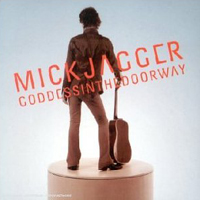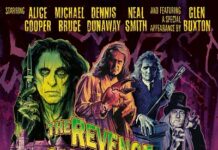The beauty behind the Rolling Stones has always been their unrefined, coarse manner. Even as they have cleaned up their act in recent years, the swagger is still very much intact. Keith Richards understands this better than anyone, and has wearily slopped his way through his career undaunted. Mick Jagger, on the other hand, has tried his best to distance himself from the crudeness by releasing his glossy and slick solo albums. It began with 1985’s She’s The Boss when Jagger brought in Nile Rodgers, Jeff Beck and Herbie Hancock — and came up with the record that many saw as the straw that almost broke up the Glimmer Twins. Enlisting A-list producers like Dave Stewart (one half Eurythmic) for 1987’s Primitive Cool and Rick Rubin for 1992’s Wandering Spirit did nothing more than purge Jagger’s zest for Stoneless detours. Still, whether he likes it or not, the Stones have remained his bread and butter. And while that hasn’t stopped Jagger from slapping together his most star-infested record, Goddess In The Doorway is more of a joint venture that finds the aging rocker graciously handing the baton to a group of anxious successors.
Taking a page from the Carlos Santana textbook of contemporary comebacks, the record opens up with Jagger and Matchbox 20’s Rob Thomas crooning their way through a rather unspectacular “Visions Of Paradise.” Fortunately, things take a big step forward with the inspiring “Joy,” teaming Jagger up with another bigger-than-life frontman, U2’s Bono. Supported by the steady acoustic hand of Pete Townshend, the song takes on an almost U2-like intensity, virtually bubbling over with divine serenity. When Jagger joins Lenny Kravitz for “God Gave Me Everything,” the album’s most scorching rocker, it’s easy to understand why the singer excels whenever he’s knocking up against another powerful personality. In another instance, Jagger gets some robust backing from Wyclef Jean on “Hide Away” before veering off into the subdued sojourns of “Don’t Call Me Up” and the title track. On “Lucky Day,” Jagger and Matt Clifford, a frequent collaborator dating back to Steel Wheels, turn in the album’s most economical package — a swift and precise exercise featuring an atonal harmonica lining delivered through the infamous lips of the midnight rambler himself.
Aerosmith’s Joe Perry pitches in on “Everybody Getting High,” a tempered riff that may leave ol’ Keef blushing. The same momentum carries through on “Gun,” a mild mannered tease with some caustic lyrics. Even as Clifford soothes out the arrangement with his Mellotron, Jagger tauntingly reiterates, “Why don’t you just get a gun and shoot it through my heart.” Any cause for alarm fades away with the album’s last two tracks. “Too Far Gone” finds Jagger, again with Perry, in an almost Aerosmithian trance. On the other hand, “Brand New Set of Rules” unveils the head Stone’s truest colors as he chants out the final chorus: “I’ve got a brand new set of rules, I’ve got to learn…” Goddess In The Doorway may court Jagger’s cosmopolitan lifestyle while somewhat shading the singer’s ability to write high impact rockers in any sort of rustic, Stonesy style. But who would have ever guessed that Mick Jagger could so gingerly bridge the gap before celebrating his 40th year as the focal point of the world’s greatest rock and roll band.
~ Shawn Perry




















